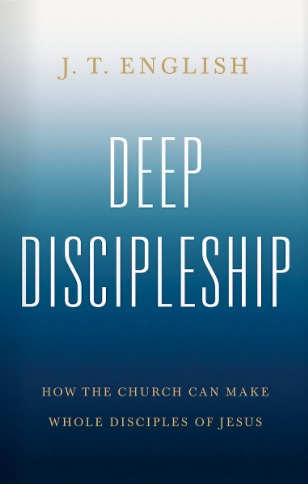Each month, you’ll hear from one of us on what we’re reading and a little bit about the book. This month we’re sharing book notes on J.T. English’s new book, Deep Discipleship. Enjoy!
What if there was a practical, biblical solution to the church attendance crisis? Research and repeated studies have shown a decline in U.S. church membership, regular attendance, and engagement even before the pandemic hit. Now, the numbers are even lower and understandably so due to health concerns, with the average church only drawing 73% of its pre-pandemic attendance levels in August 2021.1 In Deep Discipleship, J.T. English timely and practically addresses this crisis with a biblical answer that Jesus modeled in His earthly ministry.

In our attempt to solve the church attendance problem, English states, “Too often we ask the question, ‘How can we lower the bar of entry?’ But the better question is, ‘How can we raise the bar of discipleship?’ We often lower the bar so much that participation loses its value. We should lower obstacles to entry, but not expectations. People are eager to be called to something great.”
English reminds readers throughout the book that a robust ministry program is not that “something great” people are looking for. We are looking for God Himself. He says, “The primary pathway of discipleship is God himself. God is the goal of deep discipleship. God is working in the world to accomplish his purposes of bringing about the knowledge of his glory to his entire creation, and the church’s role is to align herself with the purposes of God.”
“The symptoms of people and students leaving the church, of the lack of maturing disciples, or decreased attendance are symptoms that should tell us not that we are too deep, but that we are too trivial. … They are leaving because we have not given them any reason to stay. … Deep discipleship is about giving people more Bible, not less; more theology, not less; more spiritual disciplines, not less; more gospel, not less; more Christ, not less. … We are giving people a shallow and generic spirituality when we need to give them distinctive Christianity.”
There are practical ways to help churches and individuals align and engage in this process of deep discipleship. English says, “discipleship is fueled by our beliefs about who God is,” and much of what is forming people in the church is a version of cultural Christianity rather than biblical Christianity. “The message of cultural Christianity is that God is merely good to us. The message of biblical Christianity is that God is good for us. … The message of cultural Christianity is that we should seek God in order to get things. The message of biblical Christianity is that we should seek God to get the highest thing—namely himself.”
In order to avoid the pitfall of catering our churches and ministry programs to cultural Christianity because we think it will help improve attendance and commitment, English implores us to ask and answer the right questions.
- Instead of asking, “Where can we form holistic disciples?” Ask, “Where should we form holistic disciples?
- Instead of asking, “What do disciples want?” Ask, “What do disciples need?”
- Instead of asking, “How do we maintain disciples in the local church?” Ask, “How do we grow disciples in the local church?”
- Instead of asking, “Where do some disciples go?” Ask, “Where do all disciples go?”
- Instead of asking, “Can my church do this?” Ask, “Why would my church not do this?”
If you’re a church leader and left wondering, How can my church do this?, the first step is to read the book. Though English writes at a high level rather than providing detailed specifics, he gives examples of how a church could do this and how he has experienced it in the churches he has led.
One question I wondered as I was reading is, How do we know this works? I love that English points us back to Scripture, back to Jesus’s ministry for our model of discipleship.
For me personally, reading this has been both convicting and an answered prayer. I am not a church leader today, but I am a disciple of Christ, ready to mature in my faith. I’ve felt myself disengage with church, initially for health concerns, but over time, it feels nearly impossible to get back into a routine of regular attendance and engagement.
English primarily addresses the leaders of the church, but it is also the individual’s responsibility to own his/her discipleship process. The learning moment for me is that I have viewed discipleship in a cultural context of self-improvement, which has led me to a self-focused, rather than a Christ-focused, view of discipleship. “According to Jesus, discipleship is not about self-actualization or self-preservation; it is about self-denial. All of our self-actualized visions of discipleship and our own little kingdoms need to crumble and be crucified if the kingdom of God is going to reign in our lives. … the way to follow the person of Christ is to carry the cross of self-denial, not the crown of self-improvement.”
If you are reading this and wondering, Why am I not engaging with my church?, know that you are not alone (the average church is missing 27% of its pre-pandemic population ).2 Rather than being called away from church and into something else, perhaps you are being called to go deeper and learn more about God so you can join Him in His mission. I pray you find your next discipleship step in your local church as I have been convicted to pursue my own. I also pray church leaders would turn to the One who has the answer, realizing the people of their congregation just want more of Him.

Kathleen Allen is a wife and mom from Nashville, Tennessee. She came to Christ at age twenty-one and loves women’s ministry, studying Scripture, reading, and writing to point others to Him. She serves and supports her local church’s special needs ministry, the Muscular Dystrophy Association, local pregnancy crisis center, and SearchforJesus.net. She works in human resources and organizational development at Lifeway Christian Resources.
Website: https://kathleenallen.org/
Instagram: @kathleensallen
1. Aaron Earls, “Almost All Churches and Most Churchgoers Are Now Gathering in Person,” Lifeway Research, November 2, 2021, https://research.lifeway.com/2021/11/02/almost-all-churches-and-most-churchgoers-are-now-gathering-in-person/.
2. Ibid.

